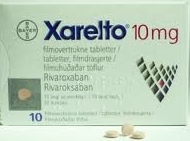 Common problem with Anticoagulants
Common problem with Anticoagulants
Unfortunately, like all anticoagulants, Xarelto has an internal bleeding risk for which there is currently no effective antidote. Thousands of adverse event reports regarding bleeding side effects, including reports of deadly complications, have been filed with the FDA over this blockbuster medication.
What is Xarelto?
Xarelto is the generic name for the drug Rivaroxaban, a blood thinner. It is a “direct thrombin inhibitor” that blocks the formation of thrombin, a blood clotting factor. Xarelto is prescribed to patients at risk for blood clot formation, deep vwin thrombosis, pulmonary embolism and stroke. Xarelto blocks the production of a protein called Factor Xa, involved in the formation of thrombin.
Xarelto vs Coumadin
Xarelto is touted as a better alternative to an older blood thinner called warfarin (Coumadin). Warfarin had been the standard anti-coagulant therapy prescribed for the past 60 years. Warfarin requires frequent blood tests and monitoring of diet to be safe and effective. The dosage of the drug is adjusted to keep the patient blood thinning level in a narrow range.
The FDA approved Pradaxa, the first of the direct thrombin inhibitor in 2010. Pradaxa was heavily marketed to both patients and doctors: main selling point was that did not require the close monitoring blood thinning levels in patients.
Xarelto was released in 2011 as a Pradaxa competitor. In the U.S. market Xarelto sales have achieved blockbuster status, the number one sales position among blood thinners. Global sales estimates for the drug in 2013 are $1.3 billion.
Eliquis (apixaban) is jointly manufactured by Pfizer and Bristol-Myers Squibb (BMS), and approved for prevention of strokes among patients with atrial fibrillation. It was introduced in 2012, as the third member of a new generation of blood thinners.
Fatal Xarelto Side Effects
The key difference between warfarin and the new generation of anticoagulants is that warfarin had an effective reversal agent to stop a bleeding event: vitamin K. Xarelto and other newer anticoagulants do not have any reversal agent or antidote.
In 2012, there had been 2081 total serious adverse event reports (151 involving fatal events) sent to the FDA regarding Xarelto bleeding side effects.
Recently consumer watchdog, the Institution for Safe Medication Practices (ISMP), issued data indicating that Xarelto has more serious adverse events than its competitor Pradaxa.
Xarelto Bleeding
Patients who experience any of the following, should seek medical attention:
- Blood in the urine
- Blood in stools
- Vomiting blood
- Severe nosebleeds
- Coughing up blood
- Stroke
- Uncontrollable bleeding
 Dallas Fort Worth Injury Lawyer Blog
Dallas Fort Worth Injury Lawyer Blog

